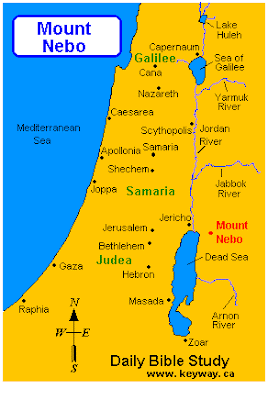Deuteronomy 34:1-6
1 Then
Moses climbed Mount Nebo from the plains of Moab to the top of
Pisgah, across from Jericho. There the LORD showed him the whole
land--from Gilead to Dan,
2 all
of Naphtali, the territory of Ephraim and Manasseh, all the land of
Judah as far as the western sea,
3 the
Negev and the whole region from the Valley of Jericho, the City of
Palms, as far as Zoar.
4 Then
the LORD said to him, "This is the land I promised on oath to
Abraham, Isaac and Jacob when I said, `I will give it to your
descendants.' I have let you see it with your eyes, but you will not
cross over into it."
5 And
Moses the servant of the LORD died there in Moab, as the LORD had
said.
6 He
buried him in Moab, in the valley opposite Beth Peor, but to this
day no one knows where his grave is.
Mt Nebo is 1,000 meter-high mountain at the northern
end of he Dead Sea. Presently it is sited in modern Jordan. At it peak,
we can see across the Jordan valley to Jericho (City of Palms) and
Jerusalem. We can also see the Dead Sea and the Sea of Galilee. On a
clear day, the site offers a panoramic view of the land that God has
promised to the Israelites. Moses must have very good eyesight to see to
the very borders of the Promised land!
The episode of Balak and Balaam (Num 22-24) also
takes place around here.
Why was Moses not allowed to enter the Promised Land?
At the beginning of the 40 years of wandering, God commanded both Aaron
and Moses to strike a rock to being forth water, which they did
in the Desert of Sin at the waters of Massah and Meribah (Exod. 17:1-7).
About 40 years later, Aaron and Moses are again desperate for water and
God commanded them to speak to the rock (Num. 20:8) but instead
they struck it and God was displeased.
(Numbers 20: 8-12)
8 "Take
the staff, and you and your brother Aaron gather the assembly
together. Speak to that rock before their eyes and it will pour out
its water. You will bring water out of the rock for the community so
they and their livestock can drink."
9 So
Moses took the staff from the LORD's presence, just as he commanded
him.
10 He
and Aaron gathered the assembly together in front of the rock and
Moses said to them, "Listen, you rebels, must we bring you water out
of this rock?"
11 Then
Moses raised his arm and struck the rock twice with his staff. Water
gushed out, and the community and their livestock drank.12 But
the LORD said to Moses and Aaron, "Because you did not trust in me
enough to honor me as holy in the sight of the Israelites, you will
not bring this community into the land I give them."
13 These
were the waters of Meribah, where the Israelites quarreled with the
LORD and where he showed himself holy among them.
Moses died in Moabite and was buried in an unknown
valley near Mt. Nebo. Aaron died and was buried at Mt. Hor, near Petra.
A question often asked here is whether God is unfair to Moses and Aaron
by not allowing them to enter the promised land for a single act of
disobedience. Moses was told to speak to the rock, not to strike it.
Looking at the text and context of the text gives us some perspectives.
Moses called the people he was leading “rebels” and said “shall we”
bring forth the water, implying that it was the work of Moses and Aaron
to provide for the people. It was not. Rather, it was the Lord who
would provide the life giving water. The incident may be summarised
thus. First, Moses disobeyed a direct command from God. God had
commanded Moses to speak to the rock. Instead, Moses struck the rock
with his staff. Second, Moses took the credit for bringing forth the
water. Notice how in verse 10 Moses said, "Must we [referring to Moses
and Aaron] bring you water out of this rock?" Moses took credit for the
miracle himself, instead of attributing it to God. Third, Moses did this
in front of all the Israelites. Such a public example of direct
disobedience could not go unpunished. Moses’ punishment was that he
would not be allowed to enter the Promised Land (Numbers
20:12). Speaking to the rock probably might also symbolize
the word of God (as given to Moses), where striking the rock represented
Moses’ effort. The life giving water is the result of God’s word, not
man’s effort.
This narrative challenges us that no matter how long in ministry and how
experienced we are. there is a need to continually guard our hearts so that
we are doing all things in and for His Glory and not ours.




